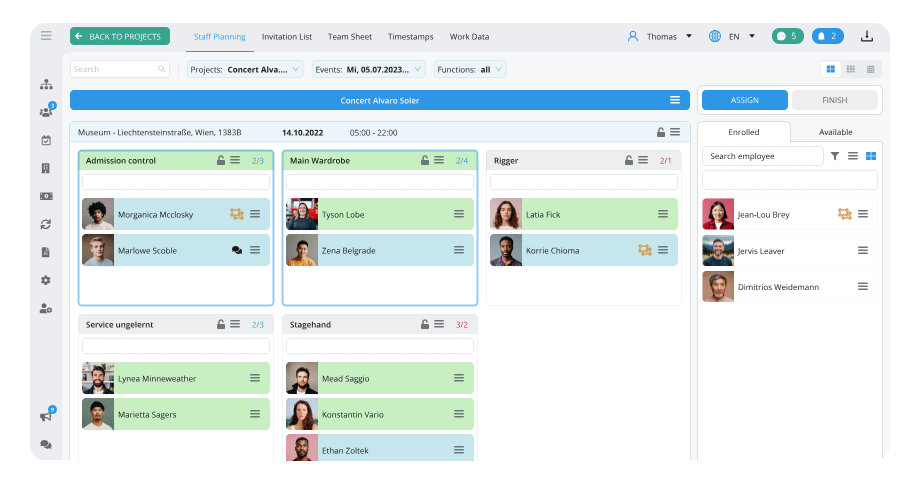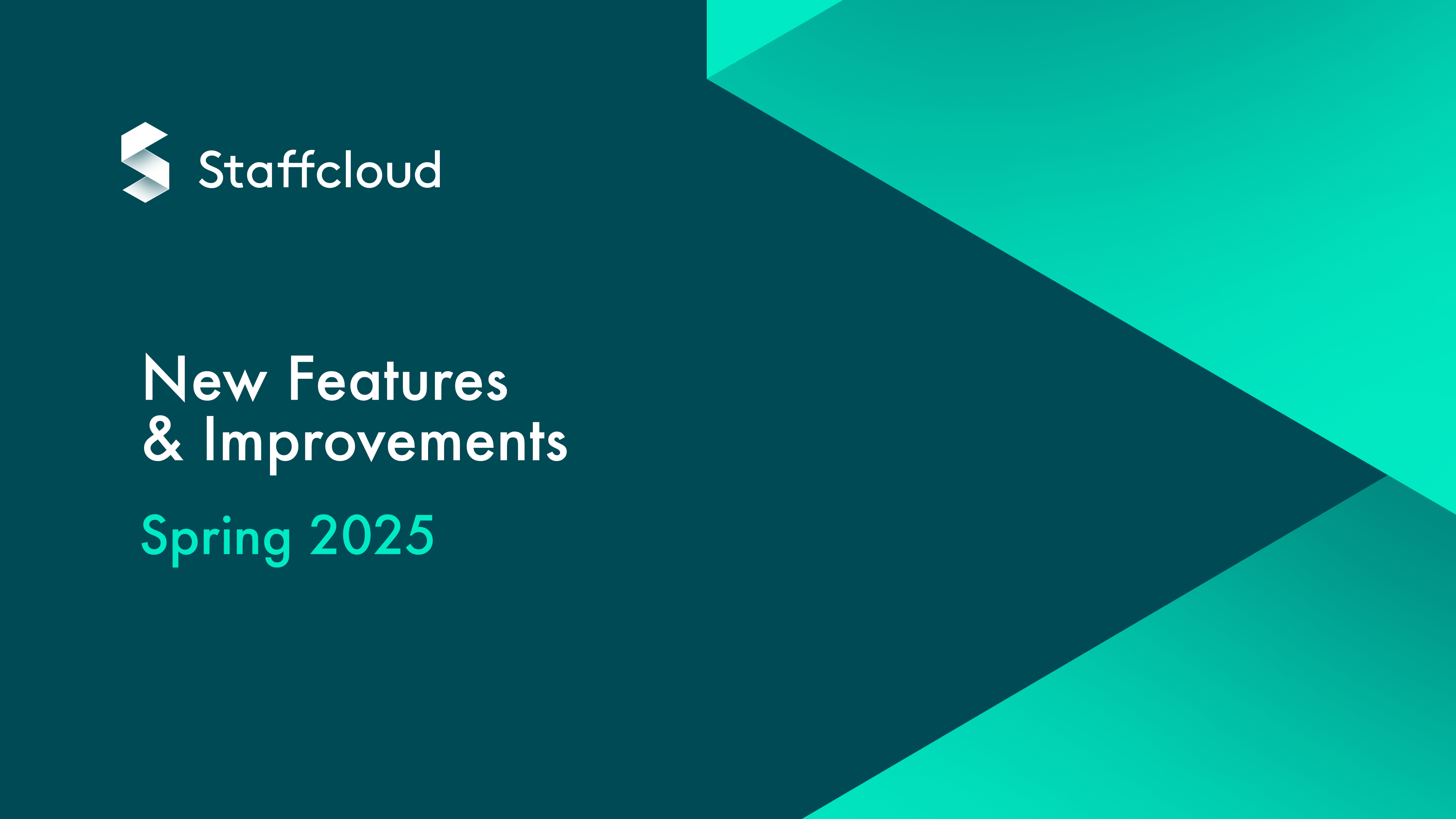Prepare For a Stellar Festival Season 2026 with Event Staff Planning Software
Festivals are a booming business, and people's appetite for them seems to only have increased in recent years. Nevertheless, with diminished and vanishing arts funding and rising operating costs, profit margins are ever slimmer, and it is important to optimise operations to remain profitable.
One way to do so is by reducing costs, and an area that is often overlooked in this regard is staff management. However, the right event staffing software can not only help optimise staff costs, but also ensure things are running smoothly. This creates a worthwhile experience for festival-goers and artists, while both organisers and staff members work in a stress-free environment.
Jump to
Are Festivals Bigger Than Ever?
Are Festivals Still Profitable?
How Can Event Staff Planning Software Help?
Are Festivals Bigger Than Ever?
There has been a trend in recent years, exacerbated by the pandemic, whereby people no longer go out regularly, but save up to go to festivals instead. This has not only led to many established festivals selling out in minutes, but also to smaller festivals growing their audience, as well as new festivals cropping up.
Partly, this trend mirrors the cost-of-living crisis. A night down the pub, with the current price of drinks being what it is, quickly racks up a bill that many are unwilling to afford. It may seem ludicrous to then spend several hundred pounds on a festival ticket instead. However, festivals are perceived as providing strong value for money, giving people an escape from their everyday lives and acting as a mini-holiday. In addition, many now offer instalment options, so the cost can be spread out, which makes them more affordable.
The other reason for the unprecedented popularity of festivals is that there has been a shift in the population, with older generations continuing to make up a large portion of festival-goers. Whereas in the past, festivals were mostly reserved for the young, and therefore had huge audience turnover, people no longer 'age out' and continue to party in their forties, fifties and beyond.
Nevertheless, it is not only festival attendees who feel the squeeze on their finances, and the very reason they might tend towards a festival rather than weekend entertainment or a holiday is also behind many festivals closing down. It is therefore important for festival organisers to be savvy about their costs and optimise their operations.
 Festivals provide more of an escape from everyday lives than other forms of entertainment.
Festivals provide more of an escape from everyday lives than other forms of entertainment.
Are Festivals Still Profitable?
Although festivals are more popular than ever and, once a festival has made a name for itself, tickets tend to sell out quickly, there are a number of costs to be taken into account, many of which need to be paid in advance of the festival going ahead. In addition, rising operating costs have meant that already small margins have become even slimmer.
Often, selling festival tickets is not enough to turn a reasonable profit, and organisers are turning to other income streams such as selling their own merchandise, offering a premium festival experience through VIP tickets or 'glamping', as well as charging for the use of facilities, such as car parks or showers. Additionally, they collect rent from vendors for their food outlets and product stalls, but they may also look for sponsoring or arts funding to help cover their costs.
Here is a breakdown of the possible costs and revenue streams for a festival:

As there are so many different expenses, keeping a watchful eye on the costs is of the utmost importance to avoid them getting out of hand. This means that strong business skills can be the difference between a festival folding and it being successful over many years. It is unsurprising then, that when organisers apply for funding or seek sponsoring, they are usually asked how they intend to make or keep their festival profitable, and investors want to see a sound business plan.
Some costs can be brought down by shopping around or negotiating a good deal, but an area that is often overlooked for cost optimisation is staffing. Considering the number of staff needed to look after thousands of festival-goers for several days, this can be a huge expense.
Why Are Staff Costs so High?
Depending on size, festivals need anywhere from hundreds to thousands of staff members for only one weekend a year, so recruiting and scheduling is often outsourced to specialised agencies. If the festival organisers also put on other events throughout the year, they may already have a pool of staff members to fill some of the roles, but the sheer number of people needed for a festival tends to mean that they have to request additional workers from personnel service providers.
To keep staff costs low, many festivals rely at least partially on volunteer work, often in exchange for free festival entry. This can be a win-win situation for both the festival organisers, who get 'free' workers, and the volunteers, as it offers the festival experience to someone who might otherwise not be able to afford it.
However, this mishmash of people can introduce some chaos into the staff planning process, as volunteers and agency staff will only arrive when the festival starts, with little to no 'briefing' beforehand. Volunteers, in particular, can also be somewhat less reliable than paid staff. In the best case, this leads to last-minute changes, while in the worst case, it can leave areas understaffed, possibly creating friction with festival-goers and artists, which can damage the festival's reputation.
How Can Event Staff Planning Software Help?
Less Stress and No Reputation Loss
Keeping track of who should work where and when can be difficult, and with volunteers thrown into the mix, it is all the harder. However, event staffing software can be uniquely helpful in this situation by making it easier to keep track of people and ensuring everyone is where they are needed.
An event staffing solution should include an app which staff members - paid personnel and volunteer workers alike - can download and which keeps them informed about their shift times, lets them check into their station via QR code and sends them notifications (or SMS where Wi-Fi is patchy) if they don't turn up for work.
In addition, managers and supervisors can keep an eye on who is working and whether they are actually there via their staff scheduling interface. This means less running around and quicker reaction times when someone is missing.
Event Staff Planning Software helps you ensure that the bars at your festival are not understaffed.
No More Work Hour Estimates
Without any digital backing and with so many things to manage, work times at big events, and at festivals in particular, tend to get over- and underestimated. This can be unfair to paid staff members, but can also mean losses for organisers, as it can quickly get expensive if a few hundred staff members' hours are rounded up.
With profit margins being tight and so many people to manage, you want to make sure that your payroll is not based on estimates. An event staff planning software with integrated QR code check-ins provides an easy way to take the guesswork out of work hours and to ensure that no one gets over- or underpaid. Simply put up QR codes at every work station and ask staff members and volunteers to scan them when they start and finish their shift. This takes minimal effort and check-in and -out times are automatically transmitted.
Less Outside Hiring
With an event staff planning solution, you have the opportunity to build up your own employee pool. You can recruit, manage and schedule all your staff on one streamlined platform. This means that when your next event rolls around, staff members who have proven to be reliable can easily be contacted and assigned to shifts without having to pick up the phone.
You are therefore less reliant on third-party agencies to provide you with staff. This has an obvious financial advantage, but also leads to spending less time on training agency staff, while giving you more control over who will work at your festival or event.
More Time to Take Care of What's Important
Event staff planning software streamlines the staffing and scheduling process, so that you can concentrate on what is really important to you, such as making sure everything goes smoothly with the artists you have booked and that festival-goers have a good time.
Because festival staff are such a vital part of the operation, their management and scheduling tends to be very time- and labour-intensive. However, staff planning software reduces the error rate and minimises your admin, which means you spend less time simply organising your staff and have more room to think about other areas of work.
If you are a small festival organiser, why not sign up for our free version to see what event staff planning software can do for you?
Are you a larger festival organiser or specialise in providing staff to festivals? Contact us to see how your staff scheduling can be optimised.
Photo credit: Image1, Image2, Image3, Infographics Background










